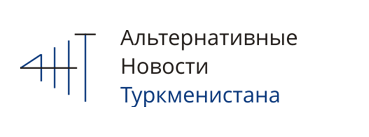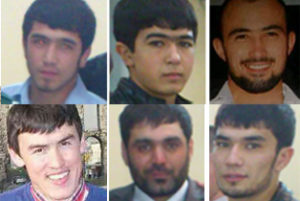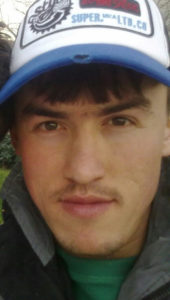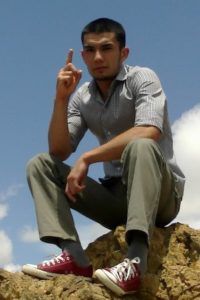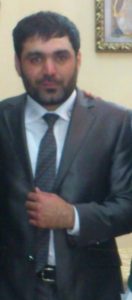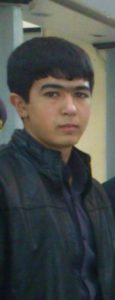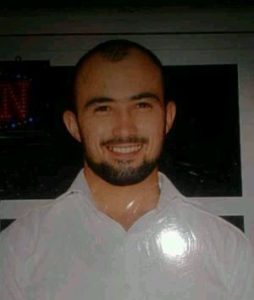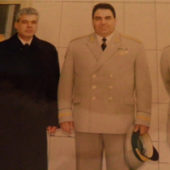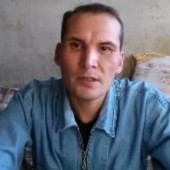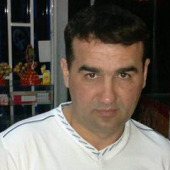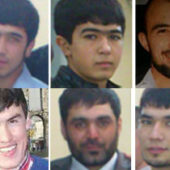Following the publications about the prosecution of Turkmenabat’s Muslim community members and their leader Bahram Saparov, ATN has been receiving new information related to this case. Bahram Saparov and his associates received long terms of imprisonment on charges of seizure of power and other serious offences, whereas in reality, according to sources, they were prosecuted for their religious beliefs and practices.
Having interviewed several people familiar with the case, ATN is trying to get closer to the truth, letting readers draw the conclusions.
Background
Starting from 2008, the regional department of ministry of national security (MNS) in Turkmenabat has been summoning the members of a local informal Muslim group that met regularly to study the pillars of Islam, one at a time. Security officers asked about why they meet, what they study, what literature they use and who supplies it to them. As Forum 18 reported, during such interrogations officers beat the young Muslims.
The MNS also regularly used its freelance provocateurs – local drug users and people with a criminal record – to harass members of the group. The young men were regularly attacked and beaten while leaving the mosque or even in the neighborhoods where they lived. Sometimes some of the Muslims would be forcibly kidnapped and taken to an unknown location. The gangs would beat and rob them and release them after they paid a ransom.
It is important to note that such attacks were held regularly and were approved by the MNS. The goal of the security services was to destroy the Muslim community and prevent their informal private meetings. Some of the community members could not take this pressure any more and gave up attending the meetings, some did it under pressure from families, and others preferred to leave the country temporarily or permanently.
Fight
In winter and spring of 2013, the campaign of harassment against young Muslim men reached the final stage after another provocation arranged by the MNS.
A few months prior to the mass arrests, some community members had yet another fight with a local criminal gang led by a man nicknamed Gosha. His real name is Atajan Charyev – a man with no permanent job, he was a local “crime boss” with an extensive criminal record. His father and two brothers shared his background. Gosha was one of those who never left the Muslim community members alone, harassing the young men on orders from the MNS. Gosha was an instrument of the MNS, helping them target people who were out of favor and, in exchange, receiving immunity for his crimes.
The fight took place in December 2012. Gosha’s gang beat up the younger brother of Atajan Reyimov – master of sport in boxing and one of the main defendants in the case, as well as some of his friends. When the community members heard about it, they joined forces (most of them had practiced martial arts) and beat up Gosha’s associates in retaliation. Later, during the trial, the MNS presented videos showing “a gang” of Muslims beating up Turkmenabat citizens “for no apparent reason,” and practicing extortion and street crime.
Mass arrests then started. On 9 March 2013, the community leader Bahram Saparov and all his associates were arrested.
Phone calls
Prior to the fight instigated by the MNS, two phone calls seem to have been crucial in this case. A person named Isa from Uchpunkt district of Turkmenabat called his mother from an unknown number. He said he was ok, but his mother suspected otherwise. She took her phone and went to the regional MNS department, where she found out that her son had called from Syria. (Much later Isa died in Syria).
The second phone call was made by a Turkmenabat resident Arslan Karymshakov (born 1987) to a member of the Muslim community. He called from Turkey and asked how things were and whether the guys continued to meet. The phone call appears to have been intercepted by the security services. Ending the conversation, Karymshakov said that “if you call yourselves Muslims, you should go to Syria and there demonstrate your belief.” When Bahram Saparov was told about this conversation, he said “if he wants, he can go there himself – our faith is different.”
Sources said that Karymshakov had visited Syria several times before where he, possibly, participated in military actions. When he tried yet again to illegally cross the Turkish-Syrian border, the Turkish security forces captured him. They deported him to Turkmenistan, where he was sentenced on various charges, including drug trafficking, and convicted to a long prison term. His further fate remains unknown.
Thus, the MNS-organized provocation (a fight) served as the basis for the criminal case against the young Muslims. Officially, they were arrested for disorderly conduct, but in reality, the goal was to liquidate their community and identify people with radical or extremist views. Among the defendants was, for example, Sultan Bebitov (born 1990) from the Central district of Turkmenabat. According to sources, years of service in an airborne battalion changed him: upon his return from the army he started practicing Islam and sharing dubious religious materials through social networks. At some point, he joined Saparov’s community.
“Yet, the community did not know much about him,” a source said. “Indeed, he attended a few meetings, but Bahram had never asked anyone’s “uch arka” [personal information and information about three generations of relatives – required in all institutions of Turkmenistan, from nurseries to employment offices], so you can’t really say that his views represented those of the entire community.”
ATN’s source added that some of the younger so-called Muslims did not have the slightest idea about Islam. They would attend a couple of Saparov’s meetings, hear him speak about life situations and daily behavior, and then proclaim themselves “true Muslims” and brag in front of their classmates that they were “a special Muslim caste” and reproach their school teachers for following a different religion. It should also be mentioned, however, that their behavior usually changed for the better: they stopped smoking, drinking alcohol and fighting with their peers. Saparov taught them to remain composed and tolerant of other people, to respect their parents, live healthy lifestyles and avoid sexual relations outside of marriage.
This and other ATN sources characterized the rest of the community members as law-abiding citizens who had jobs, took care of their families, practiced sports and were ready to help each other. Bahram Saparov himself, for example, worked in the fuel-and-oil supply service of the Turkmenabat airport. Another defendant, Azamat Kurbanov, had a family business selling sweets at the local markets. Another convict, Hasan Yusupov, worked as a hairdresser at a small market in the Central district. And none of them paraded their faith or recruited followers.
Torture and death
According to ATN sources, the tens of young people convicted on serious criminal charges – including those of allegedly inciting forcible change of the constitutional order – were in fact imprisoned for their religious beliefs. They believe they will never be freed. The security services are getting rid of them one by one: since the summer of 2016, at least two of them have died in the Ovadan Depe prison, Lukman Yaylanov from the Garabekewul district and Narkuly Baltaev from the former “Iskra” collective farm. Their bodies were given to relatives who had to sign a non-disclosure document prohibiting them from telling what they saw. The authorities clearly had something to hide: for example, Baltaev’s body, a big man in his lifetime, weighed no more than 25 kilograms.
Both prisoners were repeatedly tortured.
“When they tortured Lukman Yaylanov, we heard his cries and groans on the upper floors of the prison,” said a man who happened to serve part of his term with Yaylanov.
As for the other people convicted as part of this case – in particular, Bahram Saparov himself – Turkmenistan’s government responded to the UN Committee against Torture in November 2016 that he has been undergoing further trials and receiving further sentences “based on new testimonies against him.”
And it seems that the officers who fabricated the criminal cases against the Muslim community, beat them, used electric shocks and sexual assault to obtain confessions have not been spared, either. The first Internal Affairs investigator Agajan Muradov from Sayat district died in the summer of 2016 while escorting a drug control service vehicle from the Afghan border. The driver lost control of the car and jumped out, and the car shot into the Amu Darya River. Muradov, who was heavily drunk, could not get out and drowned. One of the officers from the Department to fight against organized crime (which was responsible for capturing the community members under MNS order) hanged himself in his office; others could not control their alcohol addiction and lost their jobs.
ATN sources said that some of the young people who were under investigation, especially 17-year-old kids who had just graduated from secondary school, under the strain of torture and abuse experienced in the pre-trial detention center repeatedly tried to commit suicide, slitting their wrists or smashing their heads against the wall. When that happened, the warders and investigators laughed and said: “And now what? Allah Akbar? Where is your Allah now?”
During interrogations, MNS officers tried to make deals with the suspects: “You testify that Bahram Saparov called on you to go to Syria for jihad, and we will let you go.” MNS officers subjected all of the participants of this criminal case to torture, especially Aybek Atajanov, who was just 17 years old, and his cousin Adylbek Atajanov – another main figure of the case.
The parents have also been undergoing torture – that of uncertainty, especially those who lost not just one relative, but several – as in the case of the Atajanov family. The relatives know absolutely nothing about these boys: what were they charged for, what kind of sentences they got – all the trials were held behind closed doors and defense lawyers were not assigned. The relatives don’t even know if their children are still alive, and if yes, where they are kept. Besides that, the relatives are regularly summoned for “conversations” with the MNS. When they try to visit prison camps, they are told that their children are not there, or that they had been transferred somewhere else. Sometimes they even say where, but it usually turns out to be a lie. Getting permission to visit them or send a food parcel is also not possible.
It’s hard to say how many people were convicted as part of this case – what is known is that the suspects had been captured in several groups of 15–20 people each. Security services had also arrested people who had simply known the main suspects – Arslan Karymshakov, Bahram Saparov, Adylbek Atajanov and Atajan Reyimov. Some of them were released after interrogations, but most just disappeared after the trial which none of the relatives knew about. Among these were the brothers Hamra and Jumabay from Dachny village near Turkmenabat airport. They were taken away, and no one has heard about them since. Their mother soon died from anxiety and uncertainty.
Family members of those suspects who were outside of Turkmenistan or managed to flee the country when the arrests had started, also fell under pressure. Parents, brothers and sisters of those suspects are not allowed to travel abroad. Moreover, the Turkmen law enforcement openly took children of the suspects as hostages and then made demands – as, for example, with Narkuly Hamraev. He was in Turkey with his wife and younger daughter when he learned that his older daughter was detained and would be released only if his wife and the other daughter returned. In the end they released the daughter, but captured Narkuly’s sister Gozel. Her fate remains unknown.
According to ATN sources in Turkey, certain members of Gosha’s (Atajan Charyev’s) gang continue their criminal activities, but now in Istanbul, deceiving and robbing their fellow countrymen – labor migrants from Lebap and Dashoguz regions, extorting money from them and selling Turkmen women into sexual slavery.
***
ATN will continue to collect evidence on this case. ATN has the personal details of nearly 30 convicted young men. ATN appeals to its readers in Turkmenistan who could be aware of this case, and to relatives of the suspects to contact us. ATN is collecting additional facts, photos of the suspects and all relevant documents (trial papers or court verdicts). Young people, your children and brothers, should not remain in prison, if they have not committed crimes.
We also appeal to the authorities to disclose materials of this case and let the relatives know what their sons and brothers had been accused and sentenced for.
